
-
Featured products
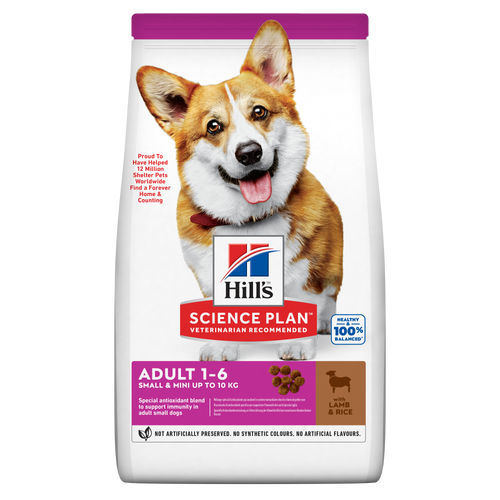 Small & Mini Adult Dog Food
Small & Mini Adult Dog FoodHill's Science Plan Small & Mini Breed Adult Dog Food with Lamb & Rice is a complete pet food, specially formulated with ActivBiome+ Multi-Benefit Technology.
Tailored nutrition for the unique needs of small dogs during the prime of their life.Shop Now Small & Mini Mature Adult Dog Food
Small & Mini Mature Adult Dog FoodHill's Science Plan Small & Mini Breed Mature Adult Dog Food with Chicken is a complete pet food, specially formulated with ActivBiome+ Multi-Benefit Technology.
Tailored nutrition to support graceful ageing in small dogs. Specially made with a synergistic blend of nutrients for energy & vigor.Shop Now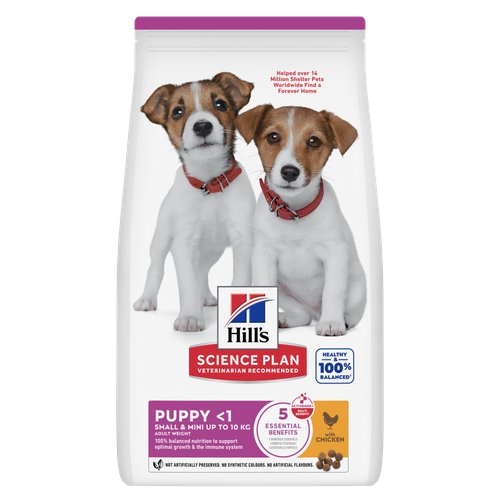 Small & Mini Puppy Food
Small & Mini Puppy FoodHill's Science Plan Puppy Small & Mini Breed Dog Food with Chicken is a complete pet food, specially formulated with ActivBiome+ Multi-Benefit Technology.
100% balanced nutrition to support optimal growth & the immune system.Shop NowFeatured products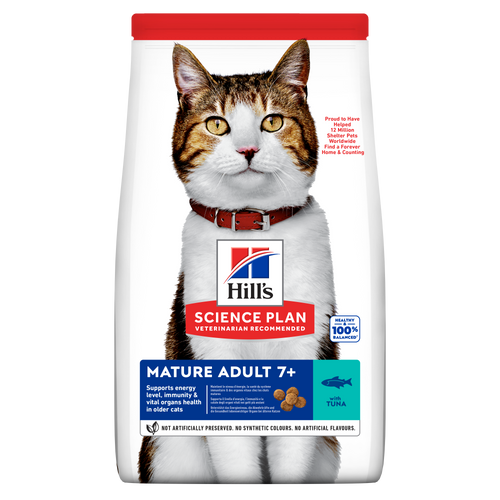 Mature Adult 7+ Cat Food
Mature Adult 7+ Cat FoodHill's Science Plan Mature Adult Cat Food with Salmon is a complete pet food, specially formulated with ActivBiome+ Multi-Benefit Technology.
This food supports graceful aging in cats, providing a synergistic ingredient blend to help support energy & activity levels.Shop Now Oral Care Adult Cat Food
Oral Care Adult Cat FoodHill's Science Plan Oral Care Adult Cat Food with Chicken contains clinically proven kibble technology to reduce plaque & tartar build up.
Shop Now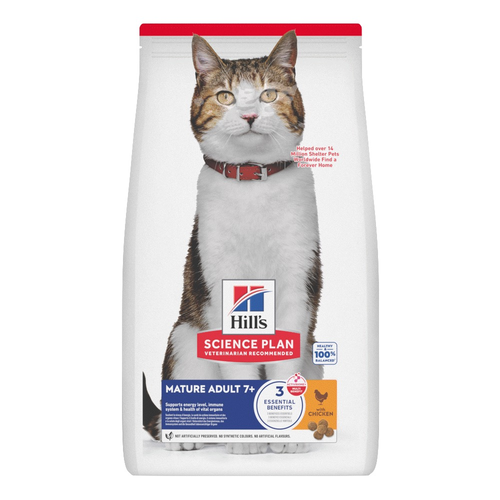 Mature Adult Cat Food
Mature Adult Cat FoodHill's Science Plan Mature Adult Cat Food with Chicken is a complete pet food, specially formulated with ActivBiome+ Multi-Benefit Technology.
This food supports graceful aging in cats, providing a synergistic ingredient blend to help support energy & activity levels.Shop Now -
Dog
- Dog Tips & Articles
-
Health Category
- Weight
- Food & Environmental Sensitivities
- Urinary
- Digestive
- Joint
- Kidney
Featured articles The Right Diet For Your Pet
The Right Diet For Your PetIn people, the right diet is very important. If you are eating the wrong way for your metabolism, activity level, age and lifestyle you could end up with health issues.
Read More Proteins
ProteinsTo make a protein, amino acids are linked together in a long chain. The chain is then bundled into to a three-dimensional structure, like a tangled ball of yarn.
Read More The Incredible Science Behind Your Pet's Microbiome
The Incredible Science Behind Your Pet's MicrobiomeLearn what your pet's microbiome is, how it contributes to your pet's gut and overall health, and why nutrition is important in maintaining healthy microbiomes.
Read More -


Bringing a puppy into your family is an exciting and joyful time, but it can also come with new concerns—like noticing dry, flaky skin on your puppy. You might spot dandruff-like flakes, especially on darker-coated pups or where they rest on dark bedding. Understanding the signs, causes, and treatments for dry puppy skin can help you keep your new furry friend comfortable and healthy.
Signs of Dry Skin in Puppies
New pet parents are often very observant, which is great for catching skin issues early. The most obvious sign of dry skin in puppies is dandruff-like flakes in their fur. It’s helpful to get your puppy used to gentle handling early on, so you can check their skin regularly by parting their fur and running your hands over their body
Dandruff may be more visible on short-haired or dark-coloured puppies. For medium or long-haired pups or those with light coats, parting the fur and closely inspecting the skin is necessary.
You may notice flakes building up more around areas that are hard for puppies to groom, like the neck or base of the tail. Additionally, your puppy might scratch more than usual due to the irritation caused by dry skin.


Tasty Tips
Causes of Dry Skin in Puppies and What to Do
There are two main reasons your puppy might have dry skin:
1. Normal Puppy Skin Development
Puppies naturally have drier skin than adult dogs because their sebaceous glands—which produce natural oils to keep skin and coat hydrated—are still developing. If your puppy isn’t constantly scratching and seems otherwise healthy, regular gentle grooming a few times a week can help remove dead skin and stimulate oil production.
2. Parasites
Puppies can acquire parasites like mites, lice, or fleas from their mother or environment. Some parasites cause intense itching, leading to flaky skin from scratching. One parasite, Cheyletiella, is nicknamed “walking dandruff” because it looks like dandruff but moves on the skin. If anyone in your household experiences itching alongside your puppy, consult a vet and doctor as this parasite can spread between humans and dogs.
When to Seek Veterinary Help
Regular vet visits for vaccinations and check-ups are an ideal time to have your puppy’s skin examined. However, if your puppy is scratching excessively, losing hair, or has bald patches or scabs, schedule a vet visit promptly.
Also, discuss your puppy’s diet with your vet. Proper nutrition is crucial for skin and coat health, especially during growth. Feeding a high-quality, balanced puppy food supports healthy skin development and overall wellbeing.
Reviewed by Dr. Hein Meyer, DVM, PhD, Dipl-ECVIM-CA


One of our staff authors prepared this article for you
Related products

Hill's Science Plan Small & Mini Breed Adult Dog Food with Lamb & Rice is a complete pet food, specially formulated with ActivBiome+ Multi-Benefit Technology.
Tailored nutrition for the unique needs of small dogs during the prime of their life.

Hill's Science Plan Puppy Small & Mini Breed Dog Food with Chicken is a complete pet food, specially formulated with ActivBiome+ Multi-Benefit Technology.
100% balanced nutrition to support optimal growth & the immune system.
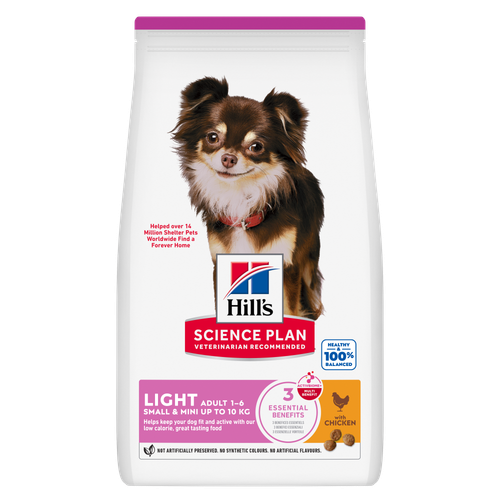
Hill's Science Plan Light Adult Small & Mini Breed Dog Food with Chicken is a complete pet food, specially formulated with ActivBiome+ Multi-Benefit Technology.
Helps keep your dog fit and active with our low calorie, great-tasting food.
Precise nutrition for less active adult small dogs that require a low calorie food to help maintain a healthy weight & lifestyle.

Hill's Science Plan Small & Mini Breed Mature Adult Dog Food with Chicken is a complete pet food, specially formulated with ActivBiome+ Multi-Benefit Technology.
Tailored nutrition to support graceful ageing in small dogs. Specially made with a synergistic blend of nutrients for energy & vigor.
Related articles

Learn more about the problem of dog obesity and more importantly, what you can do to help your dog avoid becoming overweight.

Learn what you can feed your pregnant or nursing dog to keep her and her new pups healthy.

Learn the the dangers of feeding your dog chocolate, which types are most dangerous, and what to do if you discover that they have consumed chocolate.

Learn how today's wet dog food blends have gotten a face lift, and how you'll provide your dog the nutrition he needs in the form he loves.

Put your dog on a diet without them knowing
Our low calorie formula helps you control your dog's weight. It's packed with high-quality protein for building lean muscles, and made with purposeful ingredients for a flavorful, nutritious meal. Clinically proven antioxidants, Vitamin C+E, help promote a healthy immune system.
Put your dog on a diet without them knowing
Our low calorie formula helps you control your dog's weight. It's packed with high-quality protein for building lean muscles, and made with purposeful ingredients for a flavorful, nutritious meal. Clinically proven antioxidants, Vitamin C+E, help promote a healthy immune system.

